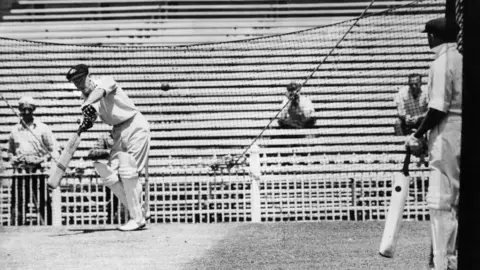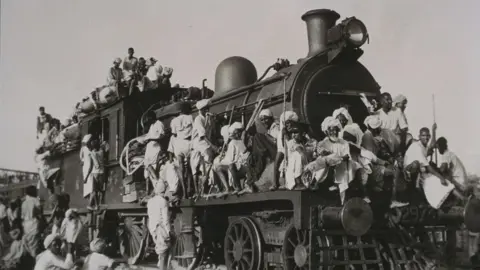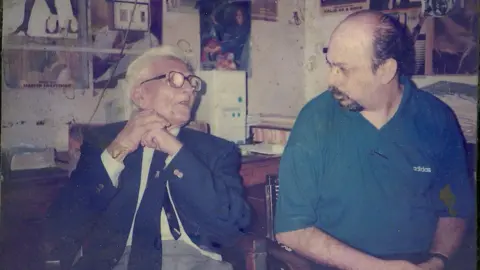 Getty Images
Getty Imagescricket-tour-of-australia-continues-a-historic-rivalry-that-has-evolved-since-1947-48.-this-fierce-competition-is-now-as-keenly-awaited-as-the-ashes.-but-the-inaugural-tour-unfolded-against-the-harrowing-backdrop-of-india’s-independence-and-partition,-with-cricketers-confronting-turmoil-and-communal-strife-at-home,-as-they-prepared-to-face-australia’s-legendary-donald-bradman-and-his-“invincibles".” class=”sc-7dcfb11b-0 kVRnKf”>India's upcoming cricket tour of Australia continues a historic rivalry that has been brewing since 1947-48. This tough competition has become as eagerly awaited as the Ashes. But the inaugural tour took place against the harrowing backdrop of India's independence and partition, with the cricketers confronting unrest and communal conflict at home as they prepared to face Australia's legendary Donald Bradman and his 'Invincibles'.
As India prepared for its first cricket tour of Australia in 1947, the country was in the midst of unprecedented upheaval.
Independence was accompanied by the painful partition of Pakistan, which triggered one of the largest and bloodiest migrations in history. Amid this chaos and as millions of people crossed borders, religious violence spread, with Hindus and Sikhs on one side and Muslims on the other. India's 16-member cricket team, selected months earlier, also had to deal with personal and national turmoil as they prepared for a landmark series.
Anthony De Mellothe President of the Board of Control for Cricket in India, announced the team against the backdrop of a map of undivided India and announced that the team would represent all of India.
Until then, the Indian cricket team – known as the All India – had only traveled to England for official Test matches three times between 1932 and 1946, losing the series each time.
But in 1946 he became a future Australian captain Lindsay Hassett brought an Australian service team to India to celebrate the Allied victory in World War II. India won the unofficial three-match series 1-0 and Hassett reported to the Australian cricket authorities that the Indians were worthy of an official Test series.
 Getty Images
Getty ImagesThere was great excitement and anticipation in Indian cricket circles as the team was expected to take on the mighty Australians led by legendary batsman Donald Bradman. His team was later dubbed “Bradman's Invincibles” after returning from England undefeated in 1948.
De Mello's India squad was led by top-class opening batsman Vijay Merchant, with his trusted partner Mushtaq Ali acting as deputy.
Both had delivered outstanding performances on the 1936 and 1946 tours of England and cemented their leadership roles. The squad also included the elegant batsman Rusi Modi and the promising debutant fast bowler Fazal Mahmoodwhich brings with it a dynamic mix of experience and fresh talent.
But both Merchant and Modi withdrew from the tour due to medical reasons. Ali also withdrew after the death of his older brother and left him with family responsibilities.
As a result, Lala Amarnath was announced as the new captain and Vijay Hazare his deputy.
However, the violence that erupted after Partition almost prevented Amarnath from reaching Australia. According to a 2004 biography by his son Rajender Amarnath, Lala Amarnath narrowly escaped a sectarian mob in Patiala, Indian Punjab. His home in Lahore, now in Pakistan, was lost forever along with his priceless artifacts.
He also found himself in danger during a train ride to Delhi.
At a station in India's Punjab, a police officer recognized Amarnath and gave him a kada – a steel bracelet that Sikhs and many Hindus wear as a religious symbol. Later, a mob at the train station spared the cricketer because of the kada – this probably made them believe that he shared their faith.
On the other side of the religious divide, pace bowler Mahmood faced a deadly mob on a train.
The team had planned a two-week training session in Pune (then Poona) from August 15 – it was not yet known at the time that this was the day of the partition of India.
 Gulu Ezekiel
Gulu EzekielDespite restrictions, Mahmood Poona reached the training camp. He then traveled to Bombay (now Mumbai) on the way to Lahore. In his 2003 autobiography, he wrote that two men threatened him on the train, but former Indian captain CK Nayudu intervened, bat in hand, and warned them.
When he reached Lahore, which was under curfew, Mahmood was horrified by the bloodshed he witnessed there and decided to stay in Pakistan and not travel through Australia. He later became part of the Pakistan cricket team and made his Test debut against India in 1952–53.
Two other members of the Indian squad for the Australia tour – Gul Mohammad and Amir Elahi – also later moved to Pakistan and played in the 1952–53 series against India.
Despite these setbacks, India's tour continued, although a weakened India played Australia without four of its leading players and lost the series 0-4.
The two countries now play against each other almost every two years. The miracle, however, is that the inaugural 1947/48 tour was able to take place at all given the turmoil at home.
Gulu Ezekiel is the author of 17 sports books, his latest book is Salim Durani: The Prince of Indian Cricket, published earlier this year
Follow BBC News India on Instagram, YouTube, Twitter And Facebook








